A Pox on the Boks
Springbok Rugby Protest – 3 July 1971
I went to a lot of protests and marches as a teenager in Melbourne but none was so brutal and scary as the demonstration against the racist South African ‘Sprinbok’ rugby team on July 3, 1971, at Olympic Park. My colleagues and I had stupidly packed a bag full of oranges to throw but we ditched these quietly when the rage of both the Police and the demo leaders became apparent in the tearing down of the wire fence around the playing field got underway. Others hadn’t ditched their weapons and the Police on horseback were pelted with all sorts of missiles. We were searched several times on entry to the ground and Police tempers were ragged. There were numerous Police horseback charges into the crowd which pushed demonstrators off the rear of the embankment where lots of paddy wagons and arrest awaited anyone who rolled to the bottom. It was such a violent atmosphere and it’s interesting to look back after nearly 50 years at the news reporting.

Situation was ‘dangerous, explosive’
MELBOURNE, Monday. — The acting Chief Commissioner of Police in Victoria, Mr Ron Jackson, described today the anti-apartheid demonstration at Olympic Park on Saturday as “the most potentially dangerous and explosive situation” he had seen in his 38 years in the police force.
He said that had the police lines been broken by the 3,000 to 4,000 demonstrators and had they entered the arena they might have been attacked by rugby supporters inside the ground.
If this had happened countless numbers would have been hurt or even killed, he said. The police action in keeping the demonstrators off the ground saved them from a possible mauling.
The Victorian Cabinet was “shocked and appalled” at the array of weapons used by demonstrators at Olympic Park on Saturday, the Chief Secretary, Mr Hamer, said today.
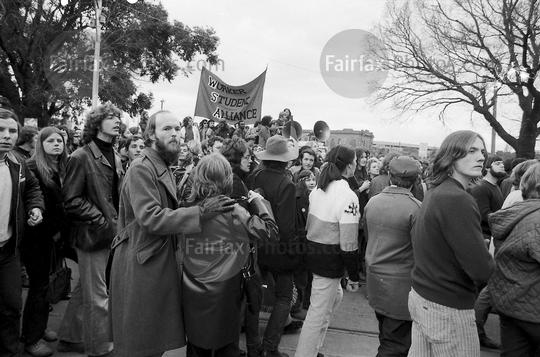
An anti-apartheid demonstration is held in Melbourne during the Springboks’ rugby union tour of Australia, 3 July 1971. Australia’s anti-apartheid movement held demonstrations throughout the South Africans’ six-week tour.
SMH Picture by Golding
Bundles of bungers
Included in the items taken from the demonstrators were a kitchen knife with a 3in blade, a sharpened file about 7in long, two screwdrivers, rocks — some with brads and staples tied to them — orange smoke flares and balloons, whistles and bundles of bungers tied together.
These are hardly things anyone would normally take to a football match, Mr Hamer said.
The violence was obviously premeditated, and the weapons used opened jp a new dimension in demonstrations in Victoria, he said.
The Victorian Council for Civil Liberties will present a detailed report alleging police violence at Saturday’s Springbok demonstration to the Chief Secretary, Mr Hamer, the council secretary, Mr J. T. Bennett, said today.
We want all complaints investigated by someone outside the police force, such as an ombudsman, Mr Bennett said.
The chairman of the Halt All Racial Tours committee, Mr G. G. Macaulay, said quite a few individuals would be taking civil action against police for assault.
We have supporting evidence from witnesses and photographs, he said.
Canberra Times (ACT : 1926 – 1995), Tuesday 6 July 1971, page 3
APARTHEID TEAM HOUNDED ACROSS AUSTRALIA BY PROTESTS
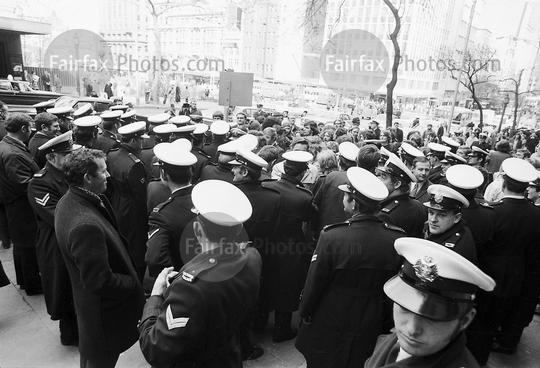
An anti-apartheid demonstration is held in Melbourne during the Springboks? rugby union tour of Australia, 2 July 1971. Australia’s anti-apartheid movement held demonstrations throughout the South Africans’ six-week tour.
SMH Picture by Golding
In scenes unprecedented in our history, the racist-based South African Rugby team has been hounded across Australia by the vehement protests of anti-apartheid activists.
Continuance of their tour has only been made possible by the protection and assistance of authorities, especially expressed in the organised thuggery of the police, in the various States visited. This police behavior stands in sharp contrast to their relatively mild response to the Vietnam Moratorium actions which happened to coincide with the racist team’s visit The contrast has given rise to speculation that government and police forces in the various States might have made a conscious tactical decision to “go easy” on the Moratorium the better to be able to crack down on the anti-apartheid protests. Here are accounts from Tribune correspondents of the anti-apartheid actions so far in Melbourne, Adelaide and Sydney.
MELBOURNE: The stay of the South African rugby team to Victoria was a hide-and-seek mystery tour, with the game against the State team being played in concentration camp conditions. And as Peter Hain told the crowd before the demonstration, such conditions were to be welcomed as they Illustrated the features of apartheid and underlined its abhorrent nature. About 5000 people marched through the centre of the city on Saturday morning prior to the game. When they reached Olympic Park they were met by charging mounted policemen and foot police who perpetrated some of the worst brutality seen in Victoria. To get into the ground, people had to run a gauntlet of three police searches of their clothing and person. Anyone who objected or protested, however mildly, was thrown out by police who lost their tempers easily. No placards or banners were admitted. Three fences and thousands of police stood between spectators and the playing arena. In some places the police were shoulder to shoulder and in others several deep. At no place were police more than a few yards apart. Yet about a dozen demonstrators succeeded in penetrating to the playing arena. They were chased by police, players and horses. Those arrested were subjected to the most brutal treatment by police. Demonstrators formed a large percentage of the crowd and their chanting drowned out all other sounds. Enough people managed to smuggle their whistles into the ground to keep up an ear-piercing din. There were shouts of “Sharpeville”, “Paint them black and send them back” and several unpleasant Afrikaans expressions which South African demonstrators had taught their Australian counterparts.
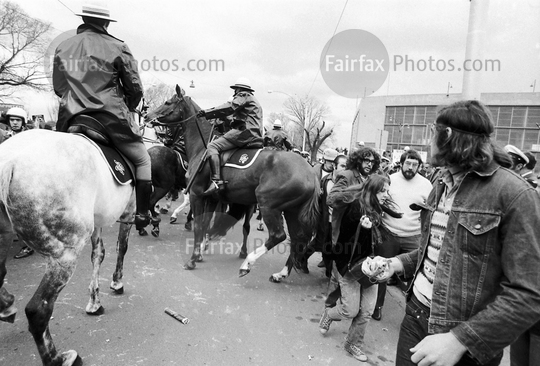
An anti-apartheid demonstration is held in Melbourne during the Springboks’ rugby union tour of Australia, 3 July 1971. Australia’s anti-apartheid movement held demonstrations throughout the South Africans’ six-week tour.
SMH Picture by Golding
As a spectacle, the game went decisively in favor of the demonstrators. The demonstrations showed the depth of feeling against apartheid and the impossibility of conducting a cricket tour later this year. Rank-and-file wharfies unloading the South African freighter Safocean Adelaide walked- off the job, saying they would ban the vessel as long as the South African rugby team was in Melbourne. When shipowners and stevedoring firms refused to isolate the ship and called for more labor for the rest of the work force, the whole port went out and stayed out until the team left. From time to time, police amplifier vans told crowds outside (that ticket holders only would be admitted. This was a lie to deter demonstrators in the hope that they would go home. Smoke bombs added to the chaotic scene. Although the game was not stopped Permanently, it was conducted in such conditions that the anti-apartheid cause won out. The scouts and spotters, helped by sympathisers, did a good job in anticipating where the South Africans were due to turn up. For example, a reception given by Melbourne’s Lord Mayor (but boycotted by most councillors) was in too and the noise could be heard the heavily curtained Mayoral rooms. They continued their rampage on July 4, when they attacked demonstrators who marched to the US consulate and South African trade commission. There were dozens of examples of Police bashing into small groups peaceful demonstrators. In one incident, a young man was bashed as he lay on the ground. He was then carried, bleeding profusely, to a police car by more sympathetic police. But the occupants of the car said, “We don’t want him”.

An anti-apartheid demonstration is held in Melbourne during the Springboks’ rugby union tour of Australia, 3 July 1971. Australia’s anti-apartheid movement held demonstrations throughout the South Africans’ six-week tour.
SMH Picture by Golding
He was taken to hospital by a passing motorist. People who are well-known as peaceful demonstrators were deliberately bashed by Police. Mrs. Jean McLean was bashed in the ribs and on the head by police after one uniformed thug shouted: “Get Jean McLean!” People with her were bashed as well.
ADELAIDE: The democratic, radical and revolutionary movements here emerged from the events surrounding the Springbok tour with great credit. Leading up to the match itself, anti-apartheid demonstrators kept up a continual harassment of the rugby team. This resulted in the measures of having to smuggle the team into Adelaide “through the back door” as Bishop Crowther said, in the same way as blacks in South Africa are treated. The continued vigil outside their motel ensured that the team got little sleep while in Adelaide. Despite high-sounding, wordy opposition to the tour by Premier Dunstan and his Government, the State police were used to give the South Africans every protection.
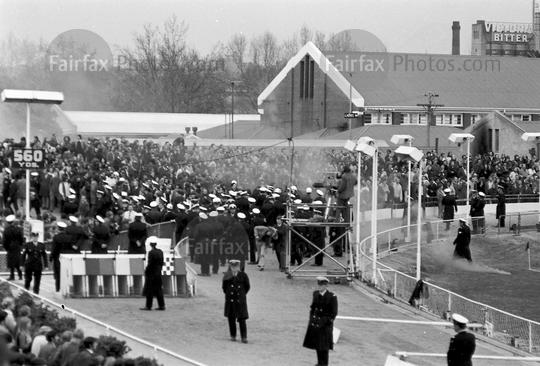
Police control anti-apartheid demonstrators during a rugby union match between Australia and the Springboks in Melbourne, 3 July 1971. Australia’s anti-apartheid movement held demonstrations throughout the South Africans’ six-week tour.
SMH Picture by Golding
710703/37
There were also declarations by Dunstan that the civil rights of those who wished to see the match should be protected and that the Government had every confidence in the police to handle any demonstrators. That they did so in the interests of apartheid was amply shown on Wednesday evening at Norwood Oval. The police, acting often with fierce brutality and in combination with thugs from the Rugby Union, were successful in ensuring completion of the match. A further eighty-odd arrests were added to the “credit” of the police and the Labor Government. Again and again, the demonstrators, individually and in small groups, forced breaches in massed police lines to enter the playing area, where they were arrested. In several cases they were pummelled by the white-coated rugby vigilantes while being held by police. After the match the opponents of apartheid forced the cancellation of a reception at the Norwood Town Hall, and still later harassed the team at their motel so that they finally left Adelaide, weary and badly shaken by their experience.
SYDNEY: The all-white Springboks team received a noisy and hostile reception from over 1000 demonstrators on their arrival last Sunday. Over 800 people had packed into the Stephen Roberts Theatre at 2 p.m. on Sunday, sitting right up to the foot of the dais, to hear Bishop E. Crowther, from Santa Barbara, California, and British anti-apartheid leader Peter Hain speak. However, shortly before Bishop Crowther ended his speech it was learned that the Springboks were due at the airport at 3.15 p.m. Over two-thirds of the audience rushed from the hall and raced to the airport. Despite repeated calls over the media from Rugby Union officials for all tour supporters to be at the airport to welcome the Springboks, only 200 subdued pro-tour forces were there when the Springboks arrived In five small’ aircraft. On their way, the planes had refuelled at Canberra, where, despite short notice, 50 anti-tour forces were there to protest. The Sydney demonstrators kept up a steady chant, combined with high-pitch whistle blowing, when the Springboks got out of their planes. A fifty-strong Black Sash protest picket outside the Squire Inn Motel, Bondi Junction, awaited the Springboks, while several hundred others chanted and booed. By 5.30 p.m. the protest crowd had swelled to 1,000 noisemakers, clashing Commonwealth Bank money boxes together, using clickers and blowing whistles, improvised drums bashed out African-style rhythms and chants of “Go home Springboks”, “Paint ’em black and send them back” and “Don’t scrum with a racist bum” sounded out. Meanwhile, inside the motel, African Rhodesian activist Sekai Holland and her husband had been allowed to take up their booking only after pressmen began to take photos as the manager moved to exclude them, even though the booking had been made several weeks before.
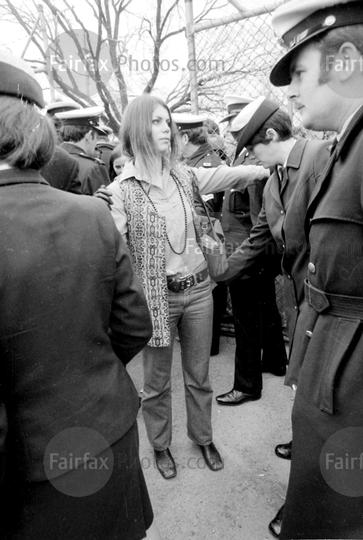
An anti-Apartheid protester is frisked at Olympic Park. By day’s end, more than 200 demonstrators had been charged.
Springbok tour. Melbourne Olympic Park 1971. A woman is searched by police who checked people entering the ground for missiles. Neg C 11107
Sekai Holland, a student, entered the motel to make a “passive protest” at the Springboks’ presence. A security man sits outside the Hollands’ hotel room door, while they have been refused permission to go on the roof. Shocked and amazed expressions from the Springboks have met them as they have strolled the corridors arm in arm. In South Africa, they would be subject to seven years jail for this sign of affection. A pause was called in the noisy protest soon after, during which the police officer in charge ordered an immediate end to any noise or instant attack and arrest. After a lengthy discussion, the crowd voted to continue a silent vigil outside the Motel. Speakers claimed a major victory already in the protest and said that if there were to be massive arrests it would be when they would be the most effective In stopping the tour. At about 2.30 a.m. in the morning, a distress flare lit up the sky and landed near the motel, for which it was apparently aimed. The news of this incident was completely blacked out in the press. Similarly, a raid on the field in Orange, where the Springboks will play NSW Country, has been totally ignored. Two hundred demonstrators gathered outside Sydney Town Hall at midday on Monday to protest against the reception being given to the Springboks Inside. Smoke bombs were thrown (picture P.1) Police moved among demonstrators and arrested at least two, including Tribune representative Denis Freney. Next main focus of action is the game to be played at Sydney Cricket Ground or Sports Ground next Saturday, July 10, at 2 p.m. Demonstrators are asked to attend a 12.30 p.m. rally at Moore Park before moving to the ground.
Tribune (Sydney, NSW : 1939 – 1976), Wednesday 7 July 1971, page 3
- Photographs courtesy of “Fairfax Media”
